Director: Elliott Lester
Writer: Javier Gullón
Producer: Darren Aronofsky
Cast: Arnold Schwarzenegger, Scoot McNairy, Maggie Grace, Martin Donovan, Hannah Ware, Mariana Klaveno, Kevin Zegers, Larry Sullivan, Teri Clark Linden
Running Time: 92 min.
By Zach Nix
Although Arnold Schwarzenegger (Maggie) is an internationally recognized commodity who was the biggest movie star on the planet in the late 80s and early 90s, he is no longer the hot topic that he used to be, at least not in the United States. His recent one-off starring ventures, such as The Last Stand and Sabotage, did not turn profits. And although team up and franchise pictures of his, such as the Expendables series, Escape Plan, and Terminator: Genisys, were more successful, they scored most of their box office numbers from over sea audiences. Therefore, Arnold is no longer the marketable and successful name that he used to be in America, which is a real shame given his past successes.
However, there is a silver lining to this period of old man Arnold’s career, and it is that he is willing to take more chances within low budget dramatic features that he probably would have never tackled during his bigger days. While general audiences are failing to see the appeal of the aged actor, he is reinventing himself like never before, which makes him all the more interesting to die-hard fans of his. The first sign of this side of Arnold came with the release of the off beat Maggie, a zombie family drama in which Arnold tries to protect his infected daughter. To see Arnold star within a zombie movie where he doesn’t go around killing zombies is quite the subversion of what one might expect from the actor and the genre, but that’s what makes his selection of said role all the more fascinating. Also, the decision to appear within a non-action film forces Arnold to flex his dramatic muscles, thereby proving his strengths as an actor, the main part of him that his critics have never been too kind about over the years.
The latest in Arnold’s purely dramatic ventures is Aftermath, a recent VOD and limited theatrical release title. Unlike Maggie, which had a bit of a genre appeal, Aftermath is a purely dramatic film with no action whatsoever. Therefore, it’s Arnold at his realest without any one-liners or massive guns to tout. And although Arnold does a fantastic job in the lead role and carries the entire picture, director Elliot Lester’s handling of the material leaves much to be desired, as the whole ordeal moves along at a rather slow pace and tends to go in circles until its bonkers finale.
Aftermath deals with, you guessed it, the aftermath of an airplane collision that results in the death of the wife and pregnant daughter of Roman (Arnold Schwarzenegger), a construction worker. It turns out that the incident was an accident brought upon by Jacob (Scoot McNairy), an air traffic controller, who had to deal with too many issues at once and did not notice two planes’ trajectories towards one another. Each man struggles with their day to day life as they try to cope with the massive tragedy. Roman handles the incident rather well and remains calm, although he demands an explanation and an apology from the airline. Jacob on the other hand takes the incident much harder, growing distant from his own family and hating himself for what he caused. Both Roman and Jacob cope with the incident over the course of the next year, until they inexplicably come in contact with one another in an inevitable confrontation.
The biggest takeaway from Aftermath, and probably the main reason anyone will bother to watch it in the first place, is for Arnold’s performance as a grieving widow. Arnold showcases immense pathos and pain here, remaining calm and cold under the surface in some scenes and openly emotional and weeping in others. While it’s clear that Arnold has to flex his emotional muscles here and not his action ones, I personally believe that his giant stature adds to his character, as I personally find large saddened people to be emphatic and interesting, as you simply want to hug and comfort them. I’d also go so far as to say that Arnold has gotten adorable with age, resembling a kind old man whom you can’t help but love and root for. It’s also intriguing to see an action hero of Arnold’s stature made so helpless even though he saves the day countless times in previous films of his. He doesn’t showcase immense range here, as Arnold is mostly kept to being as cold and silent as possible, but Aftermath should further give Arnold fans the evidence they need to throw at the Austrian’s naysayers when it comes to his dramatic acting abilities.
The supporting cast is solid too, although Lester directs everyone to be as simplistic and morose as possible. Although Arnold is the takeaway, co-lead McNairy (Sleepless) has just as much, if not more screen time as the grieving air traffic controller. Poor McNairy might have to suffer more than Arnold’s character here, as he earns everyone’s hatred after his unfortunate accident, including his own. He puts his son and wife, played by Maggie Grace (Taken), through even more pain and suffering, as he grows emotionally distant from them to the point where even they move away from him. Hannah Ware (Hitman: Agent 47) also shows up as an author writing a book on the entire incident, but she only has a few scenes here and there. Even though Aftermath may not be an action film, at least it features a cast of character actors whom have made appearances within said genre.
Lester’s abilities as a director fluctuate throughout the picture, as he directs some sequences to rousing tension and dramatic effect, while others flounder and become a dull slog, turning the whole experience into a taxing affair. Early on in the film, Lester generates immense tension as McNairy handles multiple situations at once while in an air traffic tower that ultimately leads to the fateful mid-air collision. Another highlight includes a scene where Arnold arrives upon the site of the plane crash and lies that he is not related to anyone involved in the incident just so he can investigate the site himself in order to locate his family. It’s a tense and harrowing scene that results in possibly the saddest moment I have ever seen in an Arnold film. Tense and dramatic scenes like these convey the dangers of air travel and the pain of familial loss, thereby making the film all the more relatable and powerful.
Unfortunately, once both Arnold and McNairy deal with the initial tragedy, Aftermath settles into a monotonous routine where it simple goes around in circles and doesn’t progress any further beyond the basic tragedy at hand for far too long. It’s not until the one hour mark where the film finally becomes interesting and heads into juicy Lifetime Channel territory and a bonkers finale that completely caught me off guard. While I can say that I felt confident in knowing where the film was headed, the conclusion completely shocked me and turned a rather dull affair into a seemingly worthwhile one, even though the ending didn’t feel earned. Therefore, know that Aftermath features flashes of brilliance, but nary an emotionally affective whole.
As far as airplane themed dramas come, Aftermath is a bit of an afterthought, although undeniably gripping in parts. You’ll find more gripping tension and a better sense of the human condition in Clint Eastwood’s Sully. And you’ll also probably find more juicy drama in the headlines concerning United Airline’s forced ejection of an unfortunate passenger. However, Aftermath is solid for what it is, and elevated several notches due to Arnold’s superb performance and a silly ending that I dare not spoil. Overall, there isn’t much to say about this rather simplistic picture, but genre fans should support the almighty Arnold by at least renting it.
Zach Nix’s Rating: 6/10





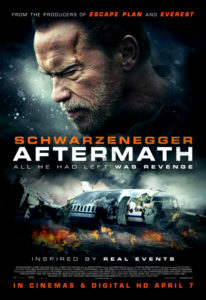


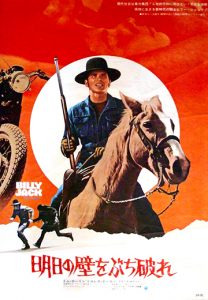
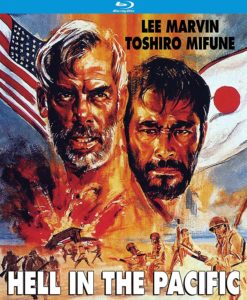
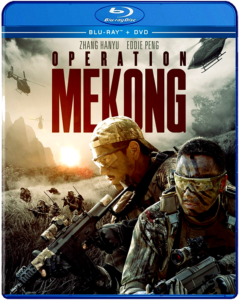

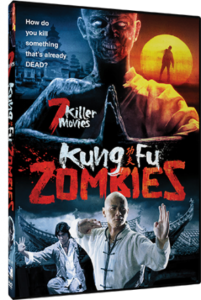
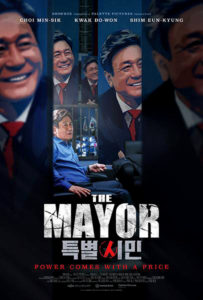
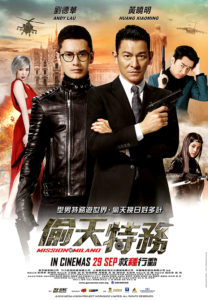
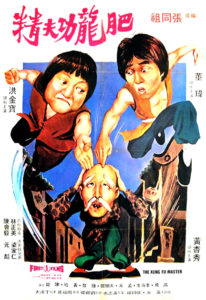
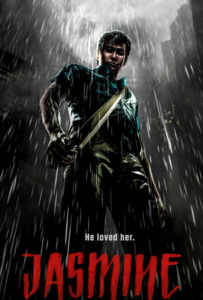
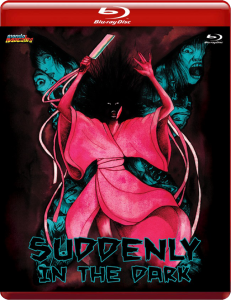
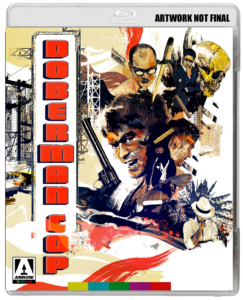




1 Comment